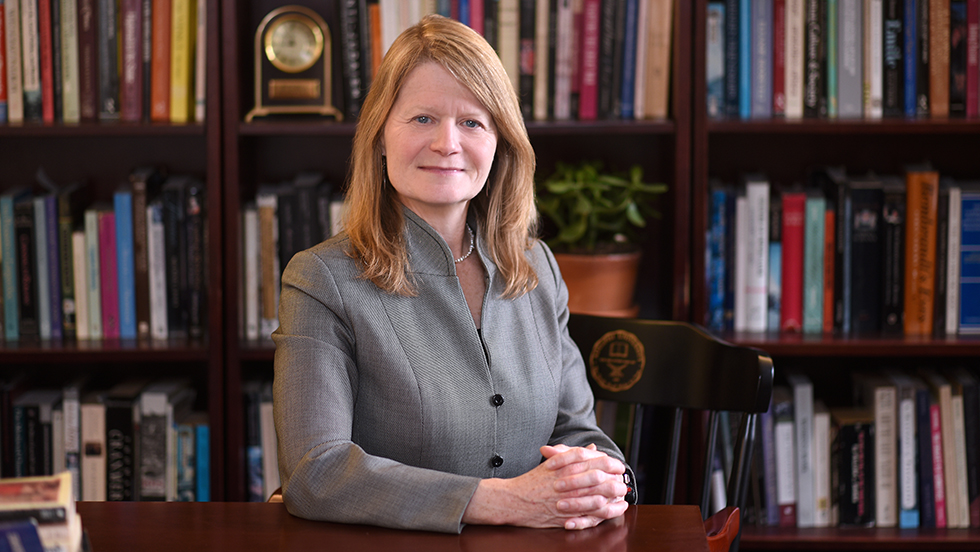
Susan Dinan, PhD, dean of the Adelphi University Honors College, is now also serving as president of the board of the National Collegiate Honors Council. Explore her vision for our own Honors College, and read about the direction she sees honors colleges heading in the future.
Susan Dinan, PhD, dean of the Adelphi University Honors College, is now president of the board of the National Collegiate Honors Council, the nation’s oldest and largest group of institutions with honors colleges.
In her new role, Dr. Dinan will help set priorities at the honors colleges at more than 700 institutions across the United States, Europe and Asia.
We asked her about issues facing honors colleges and what her goals are for the Adelphi University Honors College, which currently has 325 students.
What are some of the biggest trends you see in honors colleges across the country?
We’re seeing a real shift in honors education away from an embrace of elitism, where we talked about having the highest-performing students and the highest GPAs, to a focus based upon inclusion and diversification.
Is that happening at Adelphi? Are you looking at more than GPAs and SATs?
At Adelphi, we are no longer using standardized test scores as a gatekeeper to the Honors College because I’m not sure they do a brilliant job of predicting college success. I am concerned that requiring a minimum standardized test score would leave out a lot of intellectually curious and engaged students who could benefit from an honors program. We still have a 4.0 high school GPA requirement. We’re still looking for solid letters of recommendation and a good writing sample from the student. Any student who applies to Adelphi and says they want to be considered for the Honors College is considered.
So how are you choosing students for the University’s Honors College program now? What are you looking for?
We’re interested in students who really want to learn, who are very engaged and who are excited about the process of learning. So even if their GPA isn’t 4.0, I will read their file and I might talk to their guidance counselor. I’ll look at how challenging their coursework was in high school. We interview every candidate who seems suitable. It’s a short interview, so we don’t learn everything about them, but we can usually tell if there’s a spark of curiosity that makes them a good fit for the Honors College.
Are other honors colleges moving away from standardized test scores as the criteria for admission?
Yes, nationally there has been a move away from standardized test scores, especially after COVID. That has been very helpful to diversify pools of students.
Does making an honors program more diverse make it better? If so, how?
Yes, absolutely. Traditionally, students in honors colleges have come from well-off high schools and they tended to be white and financially secure. They would largely encounter other students like themselves in the program, even if they were on a large and diverse college campus. That meant honors college students weren’t getting experiences that would help them when they go out into the world and work and live with people who are different from them. By diversifying the students we bring into the Honors College, we’re allowing all the students to learn from one another in a way that is much richer. Students come from a broad array of backgrounds and share different perspectives with one another; this learning is essential for our students to succeed.

Dean Dinan takes an active role in Honors College life.
Have you diversified the curriculum along with the students?
Richard Garner, PhD, who ran the Honors College for 25 years, set up an incredible program. My goal was to try to figure out how to grow certain elements of it. We’ve retained the curriculum framework, but we’ve reworked some of the classes, like the yearlong class called the Human Condition, which focuses on the Great Books. The books we taught used to primarily come out of the Western canon. Now we’ve got students reading books from a wider array of cultures. This year the class will begin with texts including The Iliad, The Aeneid, The Shahnameh: The Persian Book of Kings, The Ramayana and The Tale of the Heike. We’ve changed the curriculum to better reflect the students in the classroom and expose everybody to new ideas.
What challenges have you faced as head of the Honors College?
We have a residential hall for Honors College students, but fewer than half of our students live on campus. Most of them are commuting, so it can be a little harder to build a community for them. To make sure the commuting students get a rich experience, we have Honors College classrooms in one building. We also have a big lounge area for Honors students, with computer lounges, a library and study spaces. Our commuter students can come to campus early and then just stay through the day for club meetings in the evening. They can drop off their stuff in the Honors College space, go to class, come back and hang out. We also have activities throughout the semester for the students—such as movies and craft nights—to make sure that people are connecting with one another.
What’s your number-one goal for the Honors College’s future?
In a world where chat GPT is radically altering the way we think about work, we need to make certain students recognize the value of creative thought and clear expression. We must stay a step ahead of artificial intelligence, so we must teach students to think effectively, think critically and think collaboratively.